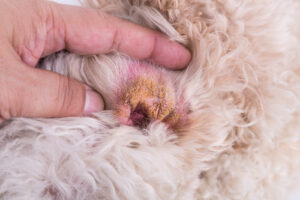Heartworm disease is a serious ailment that results in lung disease, heart failure and damage to other organs, and even death. In terms of domestic pets, it mainly affects cats, dogs, and ferrets. However, it can also occur in other animals in nature, including wolves, coyotes, foxes, sea lions, and (although rare) in human beings. This is why pet heartworm prevention is key.
Find out more about pet heartworm disease and prevention by reading our Huntington, NY animal hospital‘s article below.
In the U.S., heartworm disease has been reported in all 50 states. But it is most common along the Atlantic and Gulf coasts, from the Gulf of Mexico to New Jersey, and along the Mississippi River and its major tributaries.
The disease is caused by a parasitic worm called Dirofilaria immitis, and they are spread through the bite of a mosquito. The mosquito is the intermediate host (meaning that the worms live inside of the mosquito’s body for a short amount of time in order to become effective), and then the animal is the definitive host (meaning that the worms mature into adults, mate, and produce offspring while living inside their bodies).
They are called “heartworms” because the adults worms live in the heart, lungs, and associated blood vessels of an affected animal. Adult heartworms look like strands of cooked spaghetti. Males can reach four to six inches, and females can get up to 10 or 12 inches. The number of worms inside of an animal are called the “worm burden.”
Once an animal is infected, the adult female heartworms release their offspring, called microfilariae, into its bloodstream. This completes its lifecycle. Inside of a dog, heartworms can live for five to seven years. But inside of a cat or ferret, they live can between two to three years.
It should be noted that dogs are natural hosts for heartworms, while cats and ferrets are atypical hosts. This means that worms often do not survive to adulthood and produce, as described above. For that reason, the worm burden in cats and ferrets is typically much less. But even one worm can cause a lot of damage inside of their bodies.
Symptoms of Pet Heartworm Disease
Unfortunately, at least when it comes to dogs, signs and symptoms of heartworm often do not become evident until the animal has a higher worm burden. But when they do present themselves, they can include:
- A mild persistent cough
- Reluctance to exercise
- Fatigue after moderate activity
- Weight loss
- Heart failure
- Appearance of a swollen belly (due to excess fluid in the abdomen)
Prevention
Heartworm preventatives for dogs, cats, and ferrets come in the form of monthly chewable pills and topical “spot on” medications. There is also an injectable medicine that is given every six to 12 months. However, the injectable medication is thought to be the most effective because an animal can fail to swallow a pill or rub off ointment without you noticing. Nonetheless, all of these preventatives should be obtained through a prescription from veterinarians.
Diagnosis
Dogs
A veterinarian uses blood tests to detect heartworms in dogs. The tests detect heartworm proteins, called antigens, which are released by adult female heartworms into a dog’s bloodstream. Similar testing can be done to detect microfilariae in the bloodstream.
Cats
Diagnosis for cats can be more complicated than for dogs. It usually requires a physical exam, x-rays, a complete blood count, and several kinds of blood tests. An ultrasound may also be performed.
Treatment
Dogs
If your dog tests positive for heartworm disease, your vet will likely recommend prescription medications to treat it. They may include:
Melarsomine dihydrochloride
Also known as Immiticide and Diroban, this is an arsenic-containing drug that kills heartworms. It is administered through deep injections into the back muscles of dogs with stabilized class 1, 2, and 3 heartworm disease. Your vet will determine the injection schedule based on your dog’s condition, but most animals will receive a shot followed by a 30-day period of rest and then two more (24 hours apart) after that.
Advantage Multi for Dogs
Also known as Imidacloprid and Moxidectin, this is a topical solution that gets rid of microfilariae in the dog’s bloodstream.
Antibiotics
Many dogs are also given doxycycline to combat potential bacteria (like Wolbachia, which is one of the most common parasitic microbes) that inhabit the heartworm.
Blood Thinners
This aids in circulation.
Supplements
This helps the liver tolerate drugs and dying worms.
In the days (and weeks) after treatment is administered, it’s important that your dog gets as much rest as possible because the worms will die and start to decompose. And as they break up, they are carried to the lungs, where the body reabsorbs them. But complications can arise if the bits lodge into other parts of the body’s blood vessels, which can be caused by strenuous activity. It’s recommended that you limit your dog to leash exercise outside just long enough to urinate and have bowel movements.
Cats
If your cat tests positive, unfortunately, there is no approved drug therapy for heartworm disease for them, and the drugs used for dogs are not safe for felines.. However, veterinary care can aid in stabilizing your cat and determining a long-term management plan. However, small doses of prednisone can be prescribed in milder cases to fight inflammation.
After that care has been provided, it’s incredibly important that you monitor your cat and look for signs of spontaneous clearing of worms, respiratory distress, or other mild symptoms. If your cat has shown that it is susceptible to worm infestations, a vet will likely recommend getting x-rays of your cat’s lungs every six to 12 months.
Our Huntington, NY, Animal Hospital Can Help with Pet Heartworm Prevention
Heartworm disease can manifest itself in different ways depending on whether the infected animal is a dog, cat, or ferret. Fortunately for dogs, there are several approved drug therapies that can help in ridding their bodies of the worms, but the same cannot be said for cats and ferrets. And there can be irreversible damage done to a dog, even one that has been properly treated. So, prevention is key! Make sure that you are aware of the best way to protect your pet.
To schedule your pet’s exam, or to request refills of your pet’s preventatives, give our Huntington, NY, animal hospital team a call at (631) 271-8383.






